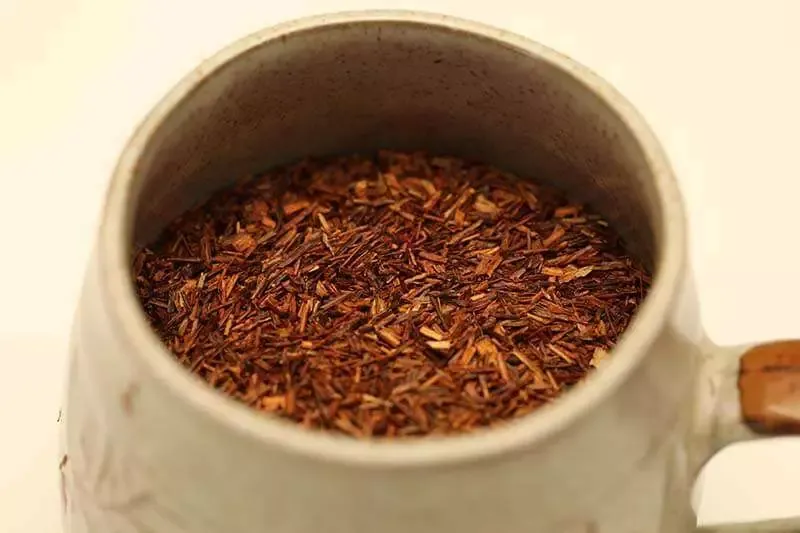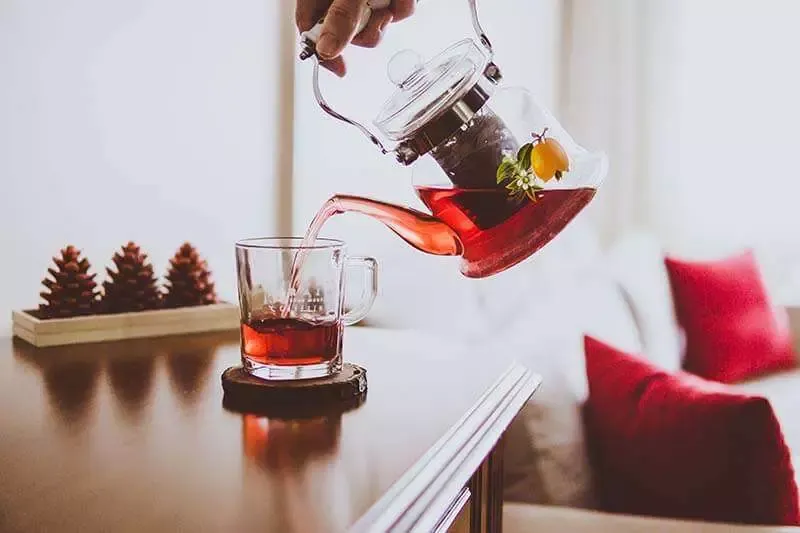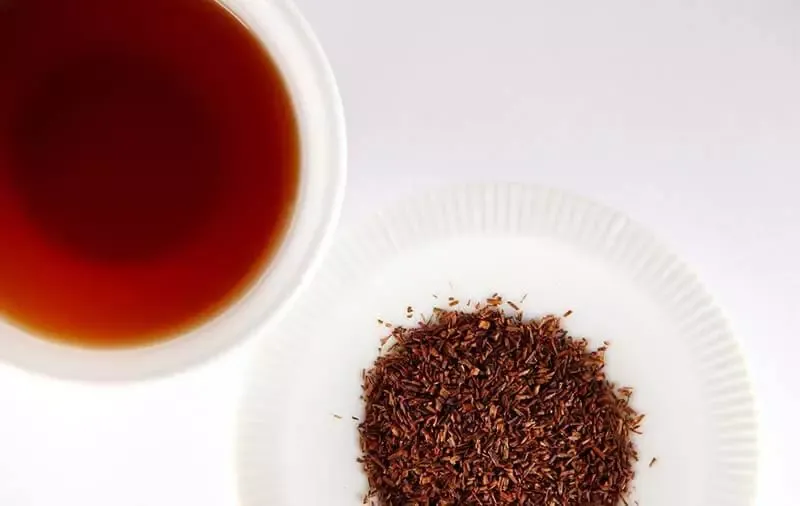Rooibos tea has become very popular over the last couple years. This herbal beverage is said to boost energy levels, reduce stress and even lower cholesterol.
Rooibos (pronounced ROY-boss) is a South African herb native to the Cape region. The leaves contain antioxidants called polyphenols, which give rooibos its distinctive flavor. Rooibos is also rich in minerals such as iron, calcium, magnesium, zinc, copper, manganese, potassium and phosphorus.
It’s true that rooibos tea contains caffeine, but it also contains other beneficial compounds that can benefit your body. In addition, rooibos tea is free from tannins, which means it won’t cause you an stomach upset or diarrhea.

What Is Rooibos Tea?
Rooibos tea is made from the leaves of a herb and traditional rooibos is produced by fermenting the leaves, which makes it a red-brown color. Some manufacturers add sugar to sweeten the drink. Rooibos tea tends to be more expensive than most other types of tea because of the difficulty involved in growing the plants.
Green rooibos tea is processed similarly to regular rooibos, except that it does not undergo fermentation. Fermentation removes some of the tannins found in the leaves, resulting in a slightly sweeter taste. Like traditional rooibos, it is sometimes mixed with herbs and spices.
The Benefits of Rooibos Tea
There are no known side effects associated with drinking cups of rooibos tea, however, there are some scientific studies that suggest it might help improve blood pressure, lower cholesterol levels, boost immune function, reduce inflammation and even treat depression. Here are some other health benefits.
Packed with antioxidants
Rooibos tea contains significant amounts of antioxidants, including aspalathin and the flavonoid quercetin. These compounds are believed to help protect cells from damage caused by free radicals, molecules that can cause cell injury and contribute to diseases like cardiovascular disease and diabetes.
In one 15-person study published in 2007, researchers found that people who drank four cups of rooibos each day had about twice as much aspalatin in their bodies compared to those who didn’t drink it. This suggests that drinking rooibos could raise your antioxidant levels.
However, any increase documented has proven to be relatively short-lived. A 2013 review of studies on the topic concluded that “there is no convincing evidence that consumption leads to increases in plasma concentrations of either total phenolics or individual polyphenols.”
The authors suggested that the reason there hasn’t been more research on the subject is because most studies focus on measuring changes in serum rather than whole blood. Serum is the liquid part of blood that separates out proteins, fats, minerals and water. Whole blood includes everything else, including the cells that contain the antioxidants. So while you might see an increase in the amount of antioxidants in your bloodstream, it wouldn’t necessarily mean that you’re getting better overall health.
Caffeine-free
Rooibos tea is often touted as being caffeine-free because it contains very little, if any, caffeine. But what does that mean? Does it mean there is no caffeine in rooibos tea? Or does it simply mean that there is less caffeine than in regular tea?
The amount of caffeine found in rooibos varies depending on the brand. Some brands contain up to 50mg per cup, while others contain as little as 2mg per cup. The amount of caffeine in rooibos depends on how long the leaves have been fermented. Though it contains caffeine, it does not contain enough to give you a buzz.
Low in tannins
Rooibos is often used as a base ingredient in herbal teas because it is naturally (almost) caffeine free and low in tannins. A cup of rooibos contains about 20 mg of caffeine, compared to 60 mg in coffee and 90 mg in black tea. Rooibos does contain some tannins, however, which are polyphenols found in plants. These compounds help protect against oxidation and bacteria growth.
But according to the results of a recent study, drinking six cups per day for six weeks had no effect on the participants’ iron status, even though they consumed less iron than usual. Researchers believe tannin consumption may actually increase iron absorption.
Heart health
Research suggests rooibos tea could actually help protect against the risk of heart disease, including heart attacks. Studies show that rooibos tea might reduce blood pressure and improve cholesterol levels. And while we don’t know the science around how exactly how it works, researchers believe it does so by reducing inflammation in the body. So next time you’re craving a hot cup of coffee, try switching to rooibos tea. You’ll feel better without the jitters.
Lowers blood sugar
Rooibos tea contains antioxidants called polyphenols such as aspalathin that are believed to lower blood sugar levels in humans. A study published in the journal Diabetes Care found that drinking four cups of rooibos daily lowered fasting blood sugar levels by about 4 points among adults with prediabetes.
The researchers say the findings suggest that rooibos could play a role in preventing or treating type 2 diabetes.
Improves appearance of skin
Rooibos tea contains antioxidants that are known to improve the appearance of the skin. A study published in the Journal of Cosmetic Science found that a product containing rooibos tea extract improved the appearance of facial wrinkles by up to 10 percent over a period of four weeks. The researchers concluded that the antioxidant properties of rooibos tea could help prevent free radical damage and lead to smoother looking skin.
The same research team conducted another study where they compared the effects of a cream containing rooibos extract against a placebo cream. They found that the rooibos extract cream produced significant improvements in the appearance of wrinkles, while the control group showed no change.
Alleviates pain
A 2013 review article published in the journal Evidence Based Complementary and Alternative Medicine examined the effects of rooibos on inflammatory conditions such as rheumatoid arthritis, asthma and ulcerative colitis. The authors concluded that there is evidence to suggest that rooibos can be effective in alleviating certain types of chronic inflammation. They also noted that further research needs to be done to determine whether rooibos has positive effects on acute inflammation.
Supports the liver and digestive system
Rooibos is a great beverage choice for anyone suffering from stomach problems because it contains several beneficial properties that support proper digestion. One study showed that people who drank rooibos daily had higher levels of liver enzymes than those who did not drink the tea.
Another study revealed that drinking rooibos regularly could help prevent diarrhea caused by food poisoning, while another study suggested that rooibos helps protect against liver disease. Rooibos is also believed to reduce inflammation in the gastrointestinal tract, and research suggests that it might even improve overall immune system functioning.
Good for your bones
Rooibos tea may improve bone density and strengthen bones. A recent study published in the Journal of Agricultural & Food Chemistry showed that rooibos extracts stimulate the formation of osteoblasts – cells responsible for producing bone tissue. While the researchers did not specifically test the effect of rooibos on bone density, they concluded that “rooibos extract stimulates osteoblast differentiation and proliferation, suggesting that it might be used to prevent osteoporosis.”
The study also revealed that rooibos contained two specific flavonoids called orientin and luteoin, both of which have been linked to bone health. Orientin acts as an inhibitor of osteoclastogenesis – the process by which osteoclasts form and destroy bone – while luteolin prevents osteoclast activation. Both of these mechanisms contribute to maintaining strong bones.
Weight management
Drinking rooibos tea could help people manage their weight. In fact, one study found that consuming just one cup of rooibos tea per day for eight weeks helped reduce body mass index (BMI), while decreasing waist circumference. Researchers believe that the antioxidant properties of the tea might play a role in helping people lose weight.
How To Drink Rooibos Tea
There are many ways to enjoy rooibos tea. You can brew it yourself using a teapot or infuser basket, or buy pre-packaged bags of loose leaves at most grocery stores. If you choose to make your own tea, here are some tips to keep in mind:

Choose a good quality product
Look for a brand with high amounts of polyphenols, which are considered to be the best type of antioxidants in rooibos.
Use fresh leaves
Steep your tea leaves in hot water for five minutes before serving. This will allow the flavors to develop.
Add milk
Some people prefer to add milk to their rooibos tea to enhance flavor. However, this isn’t necessary.
Add honey
Adding a little bit of honey to your tea adds flavor without adding calories. It also boosts the amount of antioxidants in your tea.
Make sure to use filtered water
Filtered water removes impurities that can cause unpleasant tastes.
Avoid over-steeping
If you steep your tea too long, you risk losing valuable nutrients. Steeping time should be between three and five minutes. Enjoy!
It Is Your Hangover’s Best-Friend
You know how sometimes you wake up feeling like you’ve been hit by a truck? You feel groggy and heavy headed, and everything seems to take twice as long to do. And then there are those mornings where you just don’t seem to remember anything about the previous day, and you’re wondering what happened to your memory?
Well, we’re here to tell you that rooibos tea is the antidote to a hangover. Why? Because it has many health benefits and is loaded with antioxidants, vitamin B6, magnesium, iron, calcium, copper, phosphorus, niacin, riboflavin, thiamin, folate, pantothenic acid and zinc. These elements work together to help restore your body’s balance and keep you healthy.
So next time you find yourself suffering from a hangover, make sure to grab a cup of rooibos tea and sip away. Not only will it help you recover faster, but it will also help prevent future hangovers.
Detoxing with Rooibos Tea
Did you know that rooibos contains large amounts of antioxidants, similar to those found in red wine? And that it can help boost energy levels while cleansing your system? This herbal drink is a refreshing alternative to black teas, green teas and coffee. With rooibos, there are no caffeine jitters and there is no added sugar. Plus, it doesn’t give you that nasty headache you might experience with some other types of tea.
A simple way to make a detoxifying cup of rooibos is to combine equal parts of hot water and freshly brewed rooibos. Add one teaspoon of honey to taste and stir. Let the mixture steep for five minutes before enjoying. You can add additional ingredients like cinnamon sticks or ginger slices to spice up your detox tea.
Rooibos Detox Tea Recipe
This detox tea recipe is perfect for those times you feel like indulging yourself. This drink contains some of the best ingredients to help cleanse your body. Rooibos tea is known for being rich in antioxidants, minerals and vitamins. It helps to boost metabolism and reduce bloating.
Ingredients:
1 cup (250 mL) freshly brewed rooibos tea
1/2 tsp cinnamon
1/4 tsp nutmeg
1/8 tsp cardamom
1/8 tsp ginger powder
Honey or Maple Syrup (or sugar if preferred)
Freshly Squeezed Lemon Juice (or a slice of lemon if preferred)
Cayenne Pepper
Directions:
Combine honey or maple syrup (or sugar), fresh lemon or lime juice (or another acidic fruit), and cayenne pepper in a large bowl. Mix well.
Pour mixture into a mug filled with freshly brewed, hot tea.
Enjoy!





